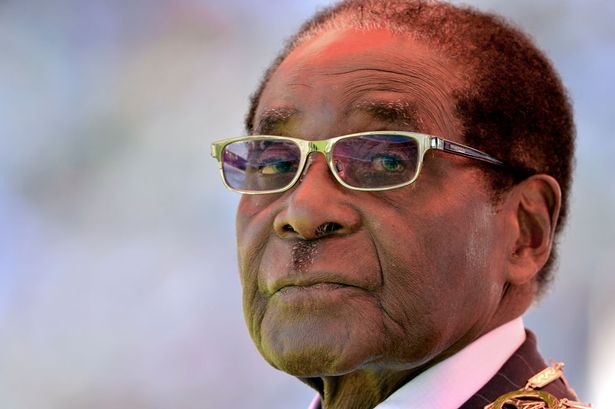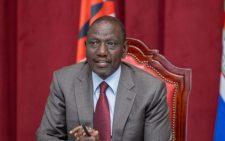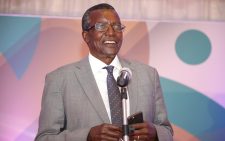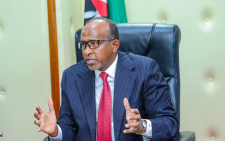Ten outstanding African revolutionaries

Robert Mugabe (ZIMBABWE)
The pan-African legend and Zimbabwe’s longest serving president died on September 6, in Singapore where he was reported to be receiving treatment.
His dictatorial and totalitarian traits will always overshadow his efforts to liberate his country from British colonisers.
Mugabe seized power from the oppressors in 1980 and had a promising start to a new Zimbabwe, only to become power-obsessive in his almost four-decade rule that collapsed in 2017 through a military coup.
It was during his reign that Zimbabwe’s economy went to the dogs as fuel shortages and corruption flourished in the backdrop of a thriving agricultural sector and a strong Zimbabwean dollar in his early days.
However, his Africanism spirit will be preserved in his unquestionable enthusiastic fight for the independence of people of Zimbabwe.
Thomas Sankara (BURKINA FASO)
Sankara changed Burkina Faso from its colonial name, the Republic of Upper Volta. He ruled the country as the first president from 1983 to 1987 when he was assassinated by troops led by his successor Blaise Compaore.
His nationalised policies that condemned foreign aid, aimed at building schools through own labour, reduce debt by proposing radical policies such as two ministers-one car, promoting public health by mass vaccination and planting more than 10 million trees drew him closer to the masses and made him a man of the people.
He was against female genital mutilation and appointed women in top government positions, which made him extremely popular among the citizens.
“While revolutionaries as individuals can be murdered, you cannot kill ideas” is one of his most powerful quotes.
Fela Kuti (NIGERIA)
Hailed as the father of Afrobeat, Kuti was not only a prolific musician, but also a rabid activist and political revolutionary in Nigeria.
He unsettled the authorities and awakened public conciousness with stinging songs on political and social injustices in the country.
He was at loggerheads with the then president Olusegun Obasanjo and was imprisoned from time-to-time because of the nature of his songs. He died aged 52 of unknown causes in 1997.
Gamal Abdel Nasser (Egypt)
He was the second President of Egypt from 1954 to 1970. He led the 1952 overthrow of the monarchy and introduced far-reaching land reforms the following year.
Following a 1954 attempt on his life by a Muslim Brotherhood member, he cracked down on the organisation, put President Mohamed Naguib under house arrest and assumed executive office.
He was formally elected president in June 1956. His popularity skyrocketed after his nationalisation of the Suez Canal in 1956.
Calls for pan-Arab unity under his leadership increased, culminating with the formation of the United Arab Republic with Syria from 1958 to 1961.
Nasser remains an iconic figure in the Arab world, particularly for his strides towards social justice, Arab unity, modernisation policies and anti-imperialist efforts.
Nasser suffered a heart attack and died in his house on September 28, 1970.
Muammar Gaddafi (LIBYA)
The late Libya national leader was a regent in the army before plotting a deadly coup to relinquish the country from the powers of King Idriss.
Gaddafi ruled the country up to 2011 when American NATO forces attacked him for arguable reasons. The US claims he was a global terrorist and a rebel leader.
In contrast, his rule gave Libya liberties many countries could only dream of. They included free education (raised literacy levels to 75 per cent), electricity, loans with no interest for farming, free medical treatment, the world’s largest irrigation system and low-cost petrol.
He may have been egocentric, overly flamboyant, an evil tycoon, but he was a true liberator and African giant.
Mo Ibrahim (Sudan)
The Sudanese-British billionaire businessman worked for several telecommunications companies before founding Celtel, which when sold in 2005had over 24 million mobile phone subscribers in 14 African countries.
After selling Celtel, he set up the Mo Ibrahim Foundation to encourage better governance in Africa, as well as creating the Mo Ibrahim Index, to evaluate nations’ performance.
In 2007, he initiated the Mo Ibrahim Prize for Achievement in African Leadership, which awards a US$5 million (Sh500 million) initial payment and a US$200,000 (Sh20 million) annual payment for life to African heads of state who deliver security, health, education and economic development to their constituents and democratically transfer power to their successors.
Ibrahim has pledged to give at least half of his wealth to charity by joining The Giving Pledge.
Samora Machel (Mozambique)
He was a Mozambican military commander, politician and revolutionary who served as the first President of Mozambique from the country’s independence in 1975.
Machel died in office in 1986 when his presidential aircraft crashed near the Mozambique-South Africa border.
He was attracted to anti-colonial ideals and began his political activities in the Miguel Bombarda hospital, where he protested against black nurses being paid less than whites doing the same job.
He later slipped to Dar es Salaam and joined FRELIMO, the nationalist movement fighting for the country’s independence from the Portuguese.
Emperor Haile Selassie I (ETHIOPIA)
Many people esteem him, especially the Caribbean community, as the deliverer of people of colour due to his ancestry that is in the lineage of Israel’s King Solomon and one of his wives Queen Sheba.
Born Tafari Makonnen, Haile Selassie is regarded as a down-to-earth leader, diplomatic servant. He would be in the frontline of advocating for education and literacy as the driver of Ethiopia’s modernity.
He began the Ethiopian Airlines to help Ethiopians commute easily from one province to another and enhance trade.
He was chosen to lead after wrangles among the country’s 83 tribes could not settle on one supreme leader due to cultural differences, but the church had a verdict for him to do so with authority.
When Italy fought tooth and nail to colonise Ethiopia, Selassie and his fellow countrymen were always one step ahead.
Ngugi wa Thiong’o (KENYA)
The award-winning, world-renowned Kenyan writer and academic got his landmark and commercially successful play Ngaahika Ndeenda (I Will Marry When I Want), shut down by the authoritarian Kenyan regime six weeks after its opening in 1977.
The controversial play covered post-colonial themes of class struggle, poverty, gender, culture, religion, modernity vs tradition, marriage and family.
Ngugi was subsequently imprisoned for over a year. Adopted as an Amnesty International prisoner of conscience, he was released from prison and fled Kenya.
In the United States, he taught at Yale University, New York University and University of California. He has frequently been regarded as a likely candidate for the Nobel Prize in Literature.
Nelson Mandela (SOUTH AFRICA)
He disarmed the South Africans from one of the longest freedom battles against apartheid rule, Mandela is a global icon for his immaculate fight for liberation and justice.
Imprisoned in 1962 for 27 years in one of the most brutal solitary confinements in Robin Island, it was in the interest of the country’s self-rule from a white minority and his peaceful and democratic stance that made him a key global figure.
He was South Africa’s president from 1994 to 1999. For his fight, he was awarded the Nobel Peace Prize in 1993. He died in 2013 aged 95.












